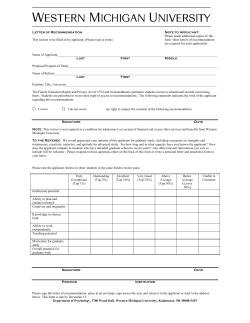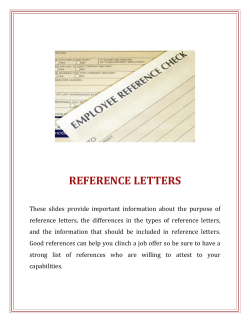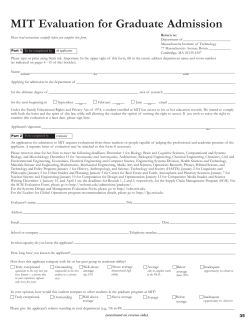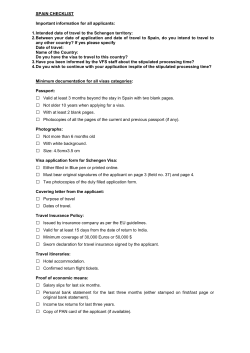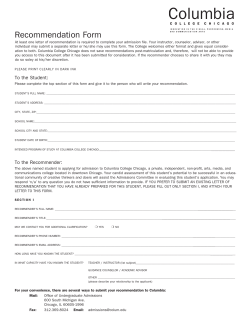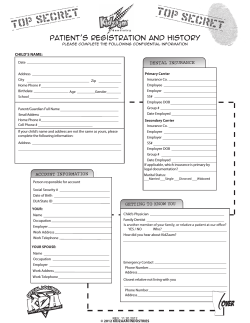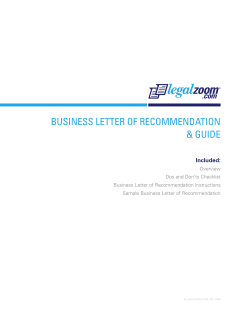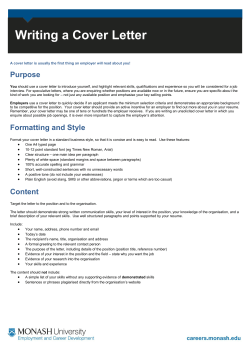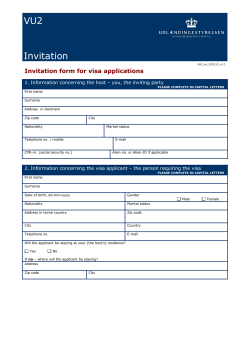
the seven golden rules of hiring a legal guide for employers
a legal guide for employers the seven golden rules of hiring 1 Present the job honestly When you advertise your vacancy in the marketplace, you and your recruitment consultant will want to present the job in the most attractive light possible. However, the Trade Practices Act prohibits a corporation from engaging in conduct that is misleading or deceptive, or that is likely to mislead or deceive. Example In a recent case, a leading stockbroking firm was found to have engaged in misleading and deceptive conduct when it told an applicant for a senior role that the terms of his employment would not change when the employer's business was acquired by another company. The applicant relied on these representations by taking steps to leave his job as quickly as possible. The court found that the employer had breached the Trade Practices Act, rendering it liable for damages and costs. Golden rule: When you are advertising and recruiting be honest: don't exaggerate the role simply to secure the best candidate. 2 Recruit fairly An employer must not discriminate unlawfully in relation to job selection criteria, employment offers, or employment terms. In Victoria, as a general rule, and unless a statutory exception applies, it is discriminatory to treat one job applicant less favourably than another on the basis of age, gender, disability, pregnancy or potential pregnancy, race, religion, political opinion, medical or criminal record, marital status, sexual preference, union activity or physical features. Example A man was refused employment as a pilot because of his age. The airline argued that it cost a great deal to train pilots and the man would be likely to be a pilot for a shorter period, due to his age. The airline was found to have discriminated against the man on the grounds of his age and was ordered to remove age as a selection criteria for new pilots. Golden rule: Consider all job applications, short list and make job offers on the basis of skills, experience and qualifications in relation to fair selection criteria only. 3 Screen candidates by relevant criteria Employers often seek information about prospective employees by conducting pre-employment checks on such matters as the candidate's medical or criminal record. It is unlawful to refuse to hire an applicant on the basis of his or her medical or criminal record, unless the refusal is based on the inherent requirements of the position. However, an employer is entitled to request that an applicant undertake a pre-employment criminal check or medical test, if it is genuinely necessary to determine whether the applicant is suitable for the role. Example A man seeking work as a school cleaner was denied a job on the basis of his criminal record, which showed a history of volatility and violence, particularly after drinking. The denial was held to be justified, because of the risk of the man displaying aggressive and violent behaviour around school-aged children. Golden rule: Before requiring criminal record or medical checks, ensure that the results are genuinely relevant to the position being filled. 4 Application forms An employment application form can list the duties of the role and ask the applicant about any pre-existing illness or injury, which the applicant is aware of and could reasonably foresee being affected by those duties. If the application form correctly refers to and complies with relevant provisions of workcover legislation, an employer can avoid workers' compensation liability in relation to an exacerbation of a pre-existing injury, which the employee did not disclose. However, if the applicant does disclose such an injury, you must not discriminate against him or her on the basis of that injury, unless it means that the applicant could not safely perform the inherent requirements of the role. Example An employee who had previously sustained a knee injury on the factory floor, but failed to disclose this pre-existing injury in his job application, would not be entitled to workers' compensation for an aggravation of the injury, suffered in the new employment. Golden rule: Written application forms should set out the physical requirements of the position, request disclosure of all relevant pre-existing injuries, correctly cite the legislative provision that requires the applicant to disclose this information, and state the consequences of failing to make a full disclosure. 5 Job interviews Questions in job interviews that focus on any unlawful ground of discrimination can themselves be found to be discriminatory. Questions should focus on whether the candidate can perform the requirements of the role, for example whether a candidate can work back late on short notice, if that is a requirement of the role, and not on irrelevant factors such as the candidate's childcare arrangements. Examples In a recent case, a female candidate with extensive relevant experience was asked a number of questions pertaining to her marital status and her intention to have children. These questions were found to be discriminatory as they were not relevant to the role. Golden rule: For consistency, a set of questions should be developed and asked of all job applicants, which allow for an assessment of the applicant's suitability against the job selection criteria. This will help avoid discriminatory questions and keep the interview on track. 6 Level 21 333 Collins Street Melbourne VIC 3000 Australia DX38455 Melbourne Telephone 61 3 9229 9999 Facsimile 61 3 9229 9900 Level 36 Chifley Tower 2 Chifley Square Sydney NSW 2000 Australia DX489 Sydney Telephone 61 2 9226 7100 Facsimile 61 2 9226 7120 www.abl.com.au Making an offer When making an offer, always make it clear to the applicant if the offer is conditional on some yet to be completed event, such as a reference check or the results of medical tests. If an employer makes an unconditional offer to a candidate but later wants to withdraw that offer, the withdrawal must occur before the candidate accepts the offer. Otherwise, the candidate can claim that a binding contract of employment had been formed, and sue for the breach of that contract when employment does not eventuate. Example A man applied for a job as an 'aircraft handler', performing engineering and maintenance duties. At one of his interviews, he was asked to perform a typical task required of an aircraft handler, to see whether it would aggravate a previous wrist injury. He performed the task, and was offered employment. On arriving for his first day at work, he was told that he would not be employed because he had failed a medical test. It was found that the employment relationship had already been created and, also, that the employer sought to terminate the employment based on the man's impairment (his wrist injury) and that this was discriminatory. Golden rule: Do not make an unconditional offer of employment unless you have all the information you need to be able to make the offer – if you don't have that information and want to make a conditional offer, ensure that the applicant clearly understands the conditions that apply to the offer. 7 Contract of employment: Probationary period The primary purpose of an employment contract is to avoid any later dispute as to the terms of the employment. A contract sets out an employee's benefits, but can also impose conditions on the employment, such as a probationary period. Employees cannot issue unfair dismissal proceedings relating to the termination of their employment during, or at the end of, a probationary period, provided that the probationary period is agreed before employment starts, is set out in writing and signed by the employee. However, if the probationary period is unreasonably long, it will not be enforced. Example In one case, it was found that a four-year probationary period was unreasonable for an ambulance driver. During that period, the driver was given three years of training, followed by a 12 month period during which there were on-the-job assessments. In that case, it was found that a three month probationary period would have been reasonable. Golden rule: It is essential that new employees be given a written contract of employment, even if it is in the form of a letter of offer, that sets out the terms and conditions that will govern the employment relationship. The contract must be as clear as possible to avoid later disputation. A written contract of employment benefits both the employer and employee, and should always be used when employing a new person in a business. Always use a written contract where you wish to apply a probationary period, and ensure that the period is reasonable. If you are in doubt about whether any aspect of your hiring campaign infringes any of these rules, you should seek legal advice. For any queries, please contact: Gary Rothville, Partner Telephone 61 3 9229 9792 grothville@abl.com.au Cathy Fitz Gibbon, Senior Associate Telephone 61 3 9229 9763 cfitzgibbon@abl.com.au Kishanie Wijewickrama, Senior Associate Telephone 61 3 9229 9849 kwijewickrama@abl.com.au Kirsten Frew, Senior Associate Telephone 61 3 9229 9749 kfrew@abl.com.au Nicole Gordon, Senior Associate Telephone 61 3 9229 9783 ngordon@abl.com.au Debra Paver, Solicitor Telephone 61 3 9229 9924 dpaver@abl.com.au Rachel Rudd, Solicitor Telephone 61 3 9229 9784 rrudd@abl.com.au Verity Okno, Solicitor Telephone 61 3 9229 9648 vokno@abl.com.au This publication is intended to provide a general outline and is not intended to be a complete or definitive statement of the law on the subject matter covered. Further professional advice should be sought before any action is taken in relation to the matters described in this publication.
© Copyright 2025

